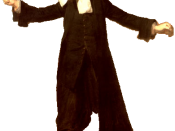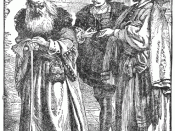Villain of Venice People often find security and self-assurance in acting evil towards other people. They may be out to destroy others, or improve their own social status. However, at the same time, the "villain" may also be out for revenge. Shylock, from William Shakespeare's The Merchant of Venice, has each of these motives as he takes on the role of the antagonist in this play. Shylock, the Jew, manages to mistreat almost everyone in his life. He especially acts as a villain towards Lancelet his young servant, Antonio the Christian, and even his own daughter, Jessica.
Shylock is a very harsh master to the young Lancelet. He is very belligerent towards the young boy, and he seems to enjoy mistreating the young boy. "Who bids thee call? I do not bid thee call." (Act 2, Scene 5, Line 9) He realizes that Lancelet is much lower than he is on the social and economic level, and he does not let the youngster forget his status by continually acting antagonistic towards him.
He makes Lancelet appear to be a sluggard who sleeps all day and does little work. He always seems to criticize the poor boy behind his back and complain about his laziness. Even after Shylock sees that Lancelet is gone, he continues to reproach his work as a servant. It seems as though Shylock is trying to elevate his own self-esteem, by acting contentious towards his servant.
The way in which Shylock treats his own daughter is beyond comprehension. He virtually locks her in the house when he goes to the masque one night. Shylock redundantly enforces the importance that she lock the house up after he leaves.
Lock up my doors, and when you hear the drum⦠Clamber not you up to the casements...


